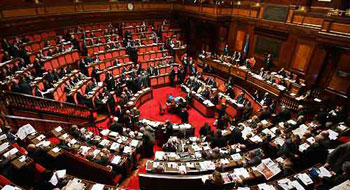 Following the large austerity packages approved in other indebted eurozone economies like Spain, Greece and Portugal, Italian Prime Minister Silvio Berlusconi yesterday announced that the austerity measures his government plans to pass on Tuesday, not only will significantly reduce the state deficit — Berlusconi’s govt aims to cut the deficit by around 13 bln in 2011– but they will also be implemented without resulting in ‘social butchery.’
Following the large austerity packages approved in other indebted eurozone economies like Spain, Greece and Portugal, Italian Prime Minister Silvio Berlusconi yesterday announced that the austerity measures his government plans to pass on Tuesday, not only will significantly reduce the state deficit — Berlusconi’s govt aims to cut the deficit by around 13 bln in 2011– but they will also be implemented without resulting in ‘social butchery.’
Reuters reports on what the Italian austerity package will likely look like via a draft it has obtained:
“Italy’s austerity budget to be approved on Tuesday will cut public sector hiring and pay, temporarily block those set to retire and reduce funding to local government….
The budget draft says only 20 percent of those who leave the public sector in 2011 to 2013 will be replaced, and it cuts transfers to municipal and regional authorities by 2 billion euros in 2011 and 3.8 billion in 2012.
Those who would have earned the right to retire in mid-2011 and at the end of 2011, according to the so-called retirement “windows”, must remain at work for a further six months.
The budget, which aims to cut the deficit by around 13 billion euros in 2011, also makes cuts in the politically sensitive area of health spending, trimmed by 0.4 billion euros next year and 1.1 billion in 2012.
Spending by government ministries, including pay, is reduced by 8-10 percent per year in 2011 to 2013.
Other policies in the draft are a 10 percent cut from 2011 in the pay of government ministers and a 10 percent cut in the pay of public sector employees earning more than 75,000 euros.
The austerity package is still being hotly debated within the government and all the measures could be subject to change before final approval. The pay cuts for high earners is being resisted particularly fiercely by some ministers.
….
Among the victims of Italy’s austerity plans is publicly funded think-tank ISAE, which conducts closely-watched surveys on Italian consumer and business confidence.
In future the functions carried out by ISAE will pass directly to the economy ministry”, the draft says.
PM Berlusconi also confirmed that Italy would bring down the budget deficit by 2012 from 5.3 percent of gross domestic product in 2009 to 2.7 percent required by the European Growth and Stability Pact.

Austerity measures are now a hot topic globally. Although it does cause large unrest in every country that it affects, can we argue against it? Aren’t the measures aiming to improve the economy in the long run?
I think Austerity measures are important only when it comes to slashing costs in the public sector and in this particular measure the Italian goverment has taken the correct stance. However it’s always been my belief that austerity measures shouldn’t pertain to low income, pension, or small business, not for the moral issue but purely for the economic issue. I believe that tax cuts should be provided to low come and small business . Not only are you providing this demographic with more money, but it’s also gives them stimulate to spend on goods and services , while a temporary but moderate higher threshold should be placed on middle to high income earners. Italy per captia has more tax evaders than any country , so the government now clamping down on tax evasion is also a correct measure.